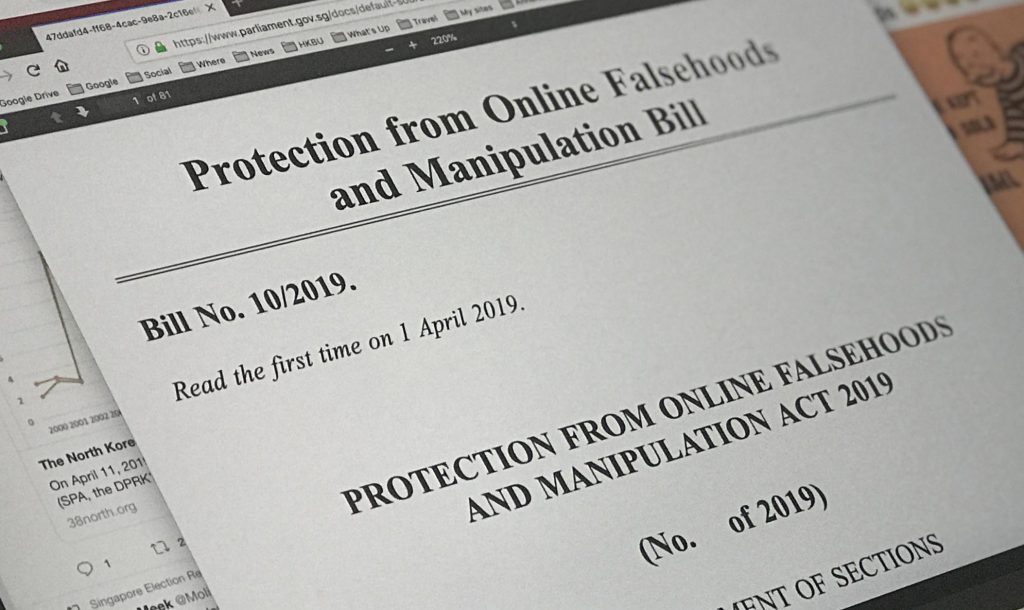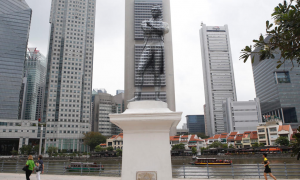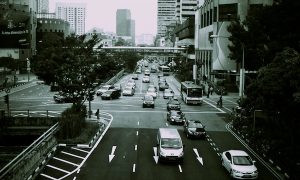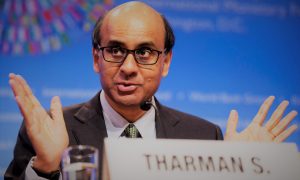Singapore’s proposed legislation against online falsehoods is probably the world’s boldest and most elaborate attempt to regulate disinformation since “fake news” muscled its way to the top of the global agenda two-plus years ago.
The proposed Protection from Online Falsehoods and Manipulation Act (POFMA) would empower the state to issue correction or take-down orders, or to fine and jail offenders in more serious cases. To close loopholes that malicious actors might exploit, the law gives government ministerswide latitude to intervene in online communications. The authorities will end up with the kind of discretionary powers their counterparts in liberal democracies can only dream of.
Those powers are a source of comfort for Singapore’s security-minded officials, and many of its citizens. Critics, however, are alarmed that the bill sidelines the courts and denies any role for an independent public body to mediate and moderate elected officials’ use of its powers. Under the bill’s definition of “public interest”, it would be legitimate to order take-downs of articles containing falsehoods that are deemed to diminish public confidence in the work of any government agency, regardless of whether that agency deserves its current levels of public confidence, or how material the falsehood is to the thrust of the article. As the International Commission of Jurists said in a letter to the government, the bill’s provisions “present a real risk that it can be wielded in an arbitrary manner to curtail important discussion of matters of public interest in the public sphere, including content critical of the government”.
Also among the groups that have expressed deep misgivings are academics, more than 100 of whom have signed a letter of concern sent to Singapore’s education minister 10 days after the bill was tabled on 1 April. I was one of the early signatories and continue to work with a handful of Singaporean scholars to try to ensure that our voice is heard.
POFMA’s passage is virtually guaranteed by a parliament in which the ruling People’s Action Party (PAP) holds 83% of the seats. Nevertheless, officials have gone out of their way to reply to us and others, through media interviews, Facebook posts, closed door dialogues, and open forums. This is a high-priority bill for them, and they are sparing no effort in persuading Singaporeans of its merits.
But it has not really been a conversation; we seem to be talking at cross-purposes. Despite our shared concern about how disinformation could harm Singapore, it is as if we inhabit different worlds: from our respective standpoints, we look at POFMA and see different things.
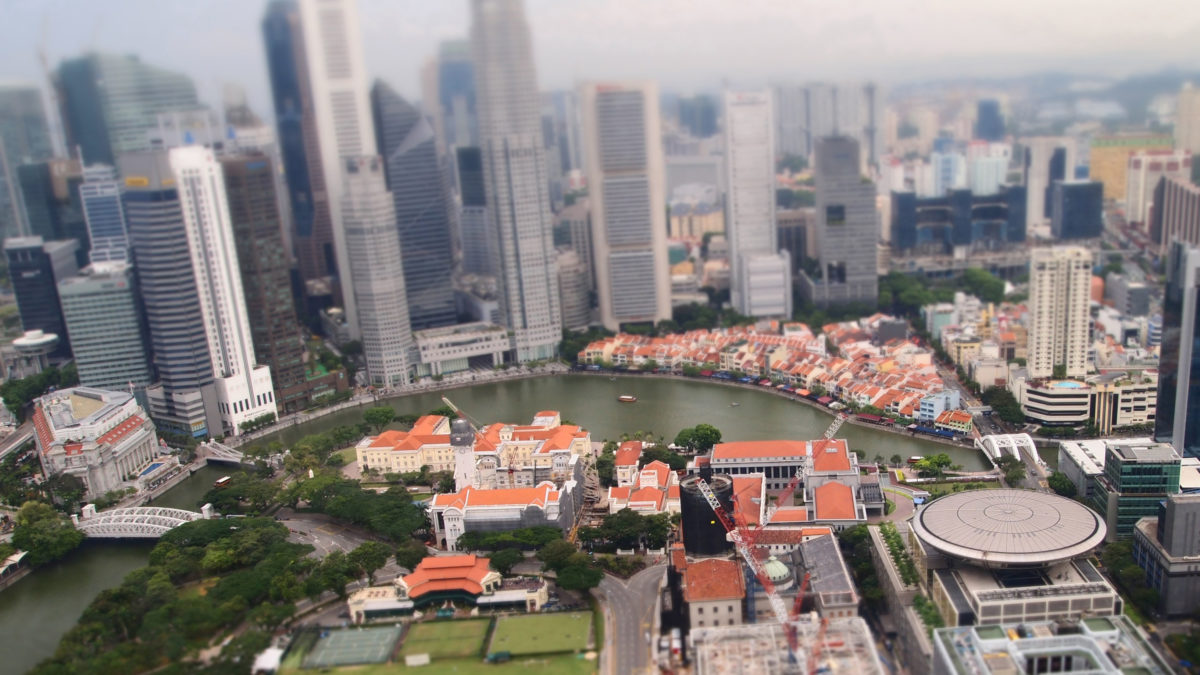
Supreme Court Building (bottom right). Critics say the law would sideline the courts, giving political office holders too much discretionary power. (Photo: Author)
The government views the proposed law as harmless to well-meaning individuals. The Ministry of Education, replying to our letter of concern, said that the legislation “will not affect academic work”. Ministers responsible for drafting the law have emphasised their honest intentions. They see it as covering black-and-white cases of untruths whose unimpeded circulation would cause real harm. Their supporters go to the extent of saying that anyone who quarrels with the bill must be in favour of fake news.
But, as our letter explains, we see POFMA as too open to misuse, not least because it enshrines an erroneous view of the truth-seeking process. It presumes that what separates truth from falsehood is always self-evident, when it is often only by challenging conventional wisdom—what most people think is self-evidently true—that knowledge advances.
The Bill’s approach to disinformation is based on artificially neat distinctions among facts, interpretations, and opinions, as well as between what’s misleading and what’s deceitful. Since its drafters assume that such distinctions are clear-cut and beyond reasonable dispute, they see no problem with giving ministers the power to make judgment calls about facts that are in contention and then to issue correction or take-down orders as they see fit.
But, history counsels us to subject truth claims not to top-down decrees by those with the most power, but to open debate, public corroboration, and independent analysis. This principle has enabled centuries of human progress, and forms the bedrock of the modern university. Singapore has punched above its weight in developing internationally renowned universities, but POFMA represents both a reputational and a material threat to its hard-won status as an educational and research hub.
As someone who studies hate propaganda, what concerns me even more is that POFMA may be a weapon that backfires in the battle against disinformation. We should be strengthening the institutions dedicated to the exercise of public reason—including academia and journalism—but the law is likely to have both a direct and an indirect chilling effect on such work, solidifying Singapore’s culture of self-censorship.
The government’s assurances are welcome, but they ultimately amount to just one set of messages amidst a whole array of conflicting signals. The net effect is to urge everyone to enter the public sphere only if one does not disagree too strongly with officialdom.
POFMA leaves too much to the imagination of both the officials who will use its broadly worded powers, and citizens who are trying to stay clear of trouble. As a result, officials will be guided by pre-existing norms and conventions when deciding what is a proper use of their new powers. Similarly, academics, journalists, and others calculating how the new law might affect them will not only weigh the government’s public statements about the Bill but also its actions over the years.
Perhaps this helps explain the communication gap we are facing in the POFMA debate. The government talks about the law and how it plans to use it. Critics of the bill, however, do not view it as some laboratory experiment hermetically sealed from the world as it is. We see it in the context of what we already know about the government’s management of information and ideas more generally. On this score, the evidence is not encouraging. Self-censorship is already pervasive, with people holding back criticism for no other reason than fear of the personal costs that speaking up would entail. I see three features in this wider context that are especially relevant to the POFMA debate.
Caught in the spin cycle
First, thanks to eagle-eyed netizens, we know there has been a pattern of trying to sanitise media reports that are potentially embarrassing to the government. I am not referring here to shoddy work that professional journalists would agree need another round of editing, nor articles that threaten Singapore’s treasured racial and religious harmony. Mainstream media are already highly attuned to those sensitivities and are rarely found wanting in that regard. Instead, many of the known interventions are instances of public opinion guidance, pressuring media to conform with official spin.
In 2017, when an accident occurred between two trains at Joo Koon metro station, the Land Transport Authority (LTA) initially asked media not to use the terms “crash” or “collision”: they should say the trains “came into contact”. This close encounter injured 36 people, so even the LTA backed off from its preferred euphemism. In 2012, when more than 100 bus drivers protested against their pay and work conditions, national media were instructed not to use the word “strike” on the grounds that the action did not match the legal definition of a strike under Singapore’s labour laws. The sensitivity here was not some threat to public order, but probably a reluctance to admit an end to Singapore’s 26-year strike-free run. A more reasonable request would have been to ask the media to clarify the legal point without stopping them from using plain English.
Even factual reporting of ministers’ statements by a newspaper of record is not sacred. In 2015, the Straits Times took down an article correctly quoting a minister’s potentially controversial remarks about public housing and social inequality. He had observed that some Singaporeans enjoyed windfall gains from their public flats, and that those living in higher-end public housing probably had little interaction with households in rental flats. Although spot-on, the politicians probably realised that these quotes would play into the hands of critics of the public housing scheme.
In another case the same year, a minister was asked, during a government feedback session on the Budget, whether National Servicemen could be paid more. She replied that their contribution could not be measured in dollars and cents. She was immediately attacked online, with some suggesting that the same principle be applied to ministers’ salaries. The Channel NewsAsia (CNA) news reports quoting her accurately were deleted entirely, seemingly for no other reason than to spare the minister further flak.
One minister commenting on a corruption scandal relating to a town council employee was quoted by CNA as saying, “you find me a set of people in the world where nobody commits offences and everyone is clean”. The Straits Times reported him saying, “you are not going to get angels in power all the time”. Although probably intended as a reality check for the public, these quotes were apparently deemed impolitic, and scrubbed from later versions of their websites.
Sadly, university leaders in Singapore are getting in on the act. An article in Today about the public universities’ obsession with rankings and lack of academic freedom was taken down in its entirety as a result of a legal threat from the National University of Singapore, which complained that the article “fell significantly short of our expectations” and “did not adequately represent NUS’ position on the matter”.
These publicly exposed examples are probably just the tip of an iceberg of routine impression management by Singapore’s establishment, using a mix of threats and self-censorship by media gatekeepers. If officials have grown accustomed to operating in such an environment, we cannot lightly dismiss the possibility that some would be tempted to apply a very low bar when deciding whether to use POFMA’s powers.
The power of overstatement
Second, there is a troubling tendency in government to up the ante by accusing critics of lying, fabrication, having a political agenda, and so on, when they offer perspectives that happen to challenge the official line.
In 2015, after the belated revelation of a cluster of hepatitis C infections at Singapore General Hospital, Straits Times journalist Rachel Chang pointed out in an opinion column that the government’s explanations had not settled the matter. It was not clear why the official timeline contained a 16-day gap between the date when a ministry official got involved (before the election day) and the date when his minister was officially informed (after election day).
Chang suggested three possible explanations for this, including that civil servants spared their political masters the burden of dealing with what could become an election issue. The Health Ministry called Chang’s column “irresponsible” and slammed the Straits Times for “repeating gossip while claiming to air opinions”. Faced with the risk of legal action, the editor of The Straits Times apologised that the column gave “wrong impressions”.
In 2017, the Reuters news agency received similar treatment. When minister Chan Chun Sing, then one of the front runners to be the next prime minister, was asked point blank if he would like the job, he replied, “All of us have to be prepared to do the job when called upon.” In most countries, such an answer would be read as a “yes”, and the politician’s use of the plural “we” interpreted as self-effacing. Reuters reported the story with the headline “Chan Chun Sing says he is prepared to be next Prime Minister when called upon”.
Local media, more attuned to how our politicians think and speak, treated Chan’s statement as a non-answer. It would have been fair to conclude that Reuters misinterpreted a quote that was deliberately enigmatic and open to interpretation. The government’s verdict, though, was far more severe. It accused Reuters of running a “fabricated” headline and quote, calling the agency “irresponsible”.
Academics have also been subject to up-the-anteism. In 2009, a Nanyang Technological University (NTU) linguistics professor Ng Bee Chin was quoted observing at an academic conference on language diversity that Singaporean children of the previous generation knew more languages than today’s children. The three-sentence quote in the Straits Times earned a letter from the office of Minister Mentor Lee Kuan Yew, which warned, “It would be stupid for any Singapore agency or NTU to advocate the learning of dialects, which must be at the expense of English and Mandarin.”
Thus, the government signalled that it would treat the academic’s unwelcome views as representing a campaign by her employer—even though, according to universal convention, scholars presenting their research at conferences are never presumed to reflect the views of their universities.
This month, in the midst of the POFMA debate, there was another remarkable official response, this time to journalist Kirsten Han and other commentators who criticised the apparent lack of consistency in the permit system for events. They noted that a prominent foreign vlogger did not require a permit for an event at the Botanic Gardens, even though local civil society activists do. This is a legitimate matter for public debate: at its heart is the question of how Singapore values civic gatherings relative to commercially-oriented celebrity events.
The police clarified that the vlogger’s event did not require a permit as it did not involve a cause. But the spokesman did not stop there. He said that the allegations of double standards were “untrue and baseless, and maliciously seek to undermine confidence in public institutions”. The language was uncannily reminiscent of POFMA, which states that a minister would be serving the “public interest” if he acted “to prevent a diminution of public confidence” in government agencies.
Nobody thinking of engaging in public debates can view the police spokesman’s reaction as anything other than a telling preview—even if inadvertent, a Freudian slip—of how POFMA-armed officials could treat fair criticism as threats to the state institutions.
In many cases, the government’s over-the-top reaction probably fails to persuade fair-minded bystanders. But they do produce another effect: warning critics that they have crossed a political line and can expect something more than words if they persist. Exaggeration and accusation are standard debating techniques to put opponents on the defensive. But Singaporeans cannot afford to dismiss these verbal jabs as merely rhetorical, when the government has the power and inclination to act on its words.
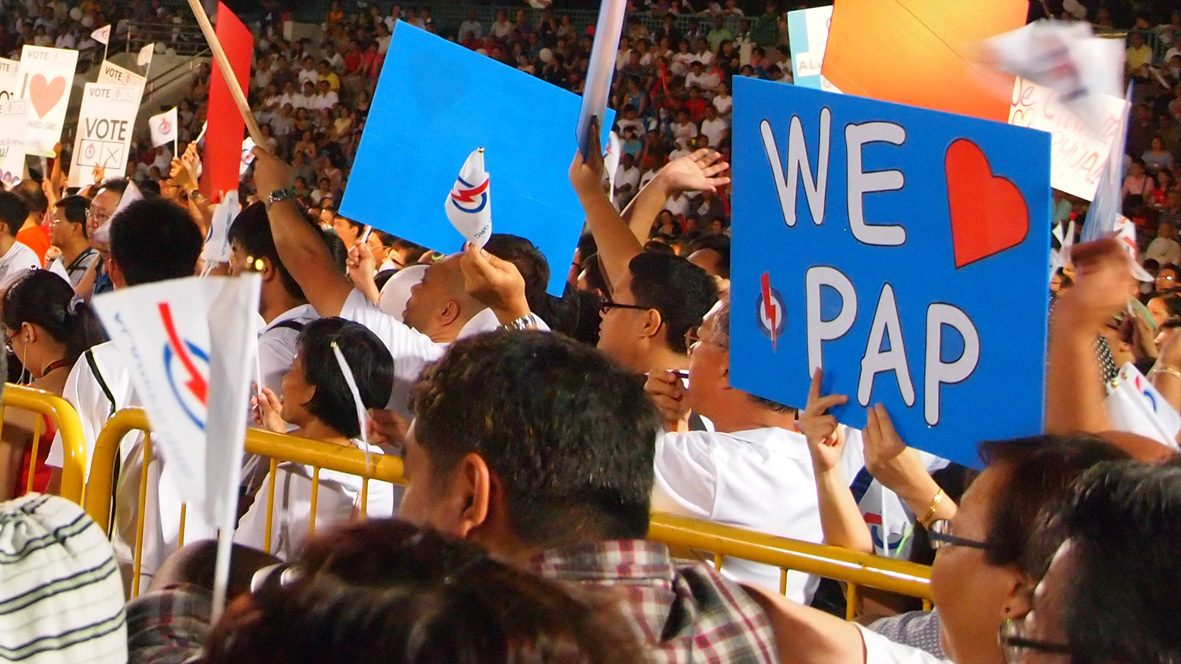
Ruling party supporters at an election rally. The majority of Singaporeans may not see anything wrong with the Bill. (Photo: Author)
Career repercussions
This brings us to my third observation. Singapore has a track record of penalising critics—not all of them, every time, but regularly enough to give academics, journalists and others cause for pause before speaking truth to power. It is widely assumed that publicly contradicting the government on issues that it considers important—everything from foreign relations to social inequality, from constitutional principles to municipal matters—can have career-limiting consequences even if one has broken no law.
Twenty years ago, one of Singapore’s only internationally renowned constitutional law scholars, Professor Kevin Tan, was chided by Lee Kuan Yew in Parliament. Tan had opined to the Straits Times that the presidency had become a “confused” institution after it was turned into an elected position. Lee, the mastermind behind the move, accused Tan of not having read Singapore’s Constitution, and said he was “alarmed” the academic was teaching constitutional law. When Tan tried to rejoin the National University of Singapore after a stint away, he found himself blocked from full-time employment.
That was 20 years ago. A shadowy system of political screening has continued to stop academics from being hired and rewarded as departments see fit. I, for one, was told by the NTU leadership that I had been assessed as academically qualified for tenure, but could not be granted it due to government objections. In 2017, writer Tan Tarn How reported documenting 14 other cases since the 2011 general election of artists and activists who said they have been denied jobs in academia or asked to leave their full-time or part-time jobs in the education sector.
On the bright side, it is certainly the case that the government has not been making maximal use of its censorship powers. Government repression is narrow enough to not affect most Singaporeans directly, which is why there are no mass protests against POFMA. (On the contrary, it is probably a popular move, appealing to the majority’s preference for law and order.)
Disinformation and democracy in Indonesia
Crackdowns on ‘fake news’ producers aren’t enough—Indonesian voters need better journalism and greater digital literacy.
To take comfort in these observations, though, would be to apply an insultingly low bar to Singapore. The more appropriate measure for a republic with Singapore’s aspirations is whether citizens are able to exercise First World levels of fearless participation in public affairs.
Wrong signals for the times
POFMA’s indirect impact may be even more significant than its direct effects. Not every situation would be covered by POFMA, but the government-knows-best principle that has been so strikingly enshrined in the new law is likely to embolden public servants in their attempts to dampen inconvenient criticism by whatever means—and they have several.
There will also be an indirect impact on academics, journalists, and other citizens. For every one who is actually at risk of violating POFMA there will be countless others who, aware of the breadth of the law and the amount of discretionary power it vests in officials, will simply decide that there are easier ways to live than to write about Singapore.
The lack of Singapore scholarship in the humanities and social sciences, which other scholars and I have separately written about, is beyond embarrassing. It is a crisis that will corrode Singapore’s capability to deal with a complex future. Recent efforts to promote such scholarship are no match for the institutionalised disincentives against studying Singapore, especially in those areas that the government has flagged as sensitive by cracking down on criticism.
Meanwhile, the government’s micromanaging of mainstream media has contributed to a degradation of journalism’s capacity for intelligent sense-making of current events. The journalist Rachel Chang, for example, decided to leave the Straits Times soon after the paper was forced to apologise for her column about the Hepatitis C scare at Singapore General Hospital. She is now a Bloomberg correspondent in Shanghai—one of many outstanding Singaporean journalists of her generation who have given up pursuing their calling in the country they love.
Even if online falsehoods and manipulation were the single most important threat facing Singapore—which it is not—POFMA in its current form is counterproductive. All serious analyses of the problem, including by the 2018 Parliamentary Select Committee that led up to the bill, agree that it is not enough to weaken bad-faith communicators; we also need to strengthen the institutions whose job it is to exercise public reason. In its zeal to fight the true enemy, POFMA threatens to injure allies in both academia and media.
 Facebook
Facebook  Twitter
Twitter  Soundcloud
Soundcloud  Youtube
Youtube  Rss
Rss 